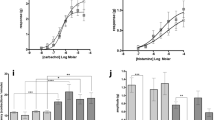It has been demonstrated that nitric oxide (NO) is a major inhibitory nonadrenergic, noncholinergic (NANC) neurotransmitter in the gastrointestinal (GI) tract. NO released in response to nerve stimulation of the myenteric plexus causes relaxation of the smooth muscle. NO is synthesized by the activation of neuronal NO synthase (nNOS) in the myenteric plexus. Released NO plays an important physiological role in various parts of the GI tract. NO regulates the muscle tone of the sphincter in the lower esophagus, pylorus, sphincter of Oddi, and anus. NO also regulates the accommodation reflex of the fundus and the peristaltic reflex of the intestine. Previous studies have shown that NOS inhibitors delay gastric emptying and colonic transit. The reduction of nNOS expression, associated with impaired local production of NO, may be responsible for motility disorders in the GI tract. There is accumulated evidence that dysfunction of NO neurons in the myenteric plexus may cause various GI diseases. These reports are reviewed and possible mechanisms of altered nNOS expression are discussed in this article. In particular, impaired nNOS synthesis of the myenteric plexus seems to be an important contributing factor to the pathogenesis of achalasia, diabetic gastroparesis, infantile hypertrophic pyloric stenosis, Hirschsprung's disease, and Chagas' disease. Reduced NO release and/or nNOS expression are suspicious in a subset of patients with functional dyspepsia. Although the etiology of intestinal pseudo-obstruction remains unknown, it is conceivable that extrinsic denervation may upregulate nNOS expression, resulting in enhanced muscular relaxation and disturbed peristalsis. An animal model of colitis showed impaired nNOS expression in the colonic myenteric plexus. Antecedent infection may be associated with the impaired NO pathways observed in functional dyspepsia, colitis, and Chagas' disease.
Similar content being viewed by others
Author information
Authors and Affiliations
Additional information
Received: September 9, 2002 / Accepted: February 21, 2003
RID="*"
Rights and permissions
About this article
Cite this article
Takahashi, T. Pathophysiological significance of neuronal nitric oxide synthase in the gastrointestinal tract . J Gastroenterol 38, 421–430 (2003). https://doi.org/10.1007/s00535-003-1094-y
Issue Date:
DOI: https://doi.org/10.1007/s00535-003-1094-y




